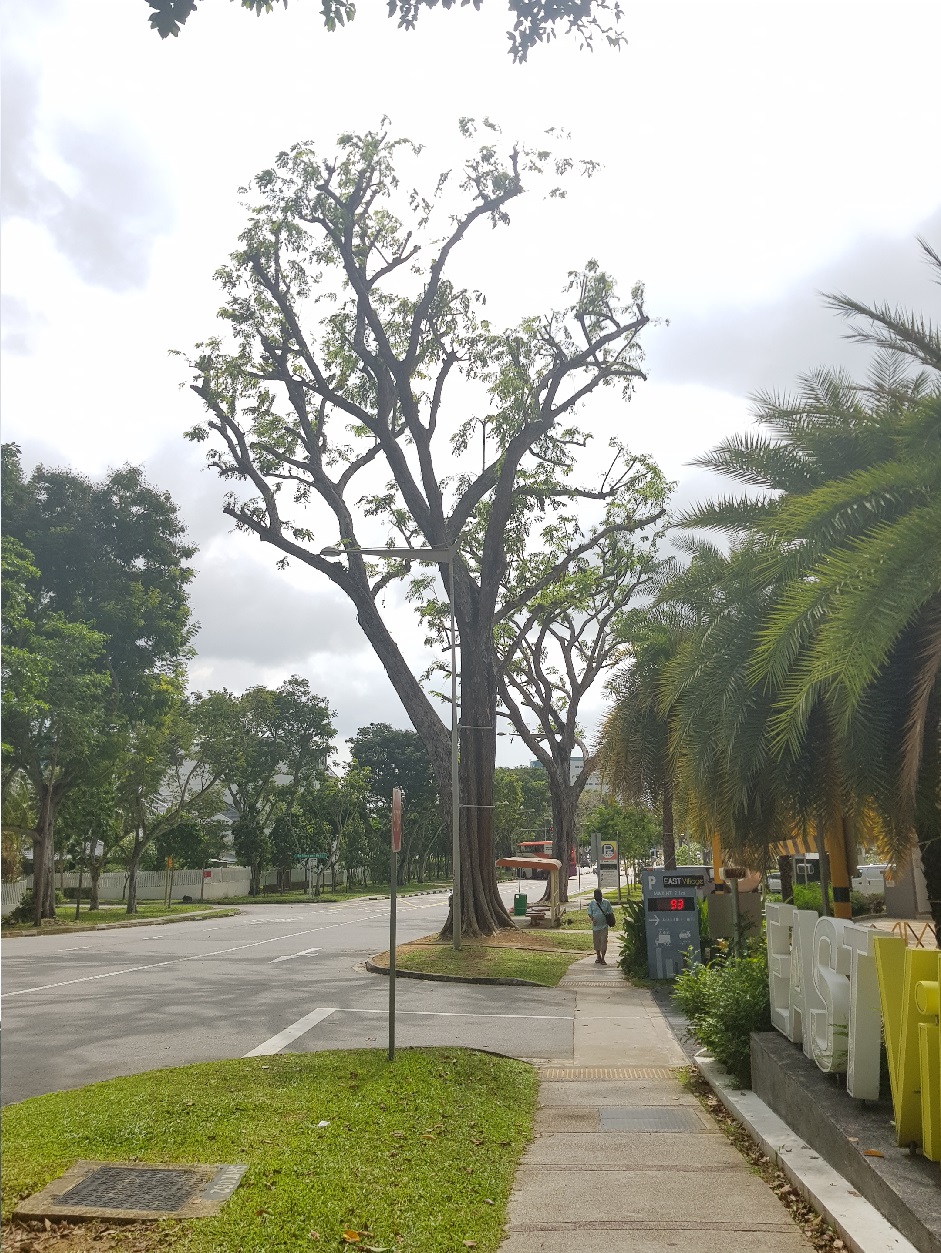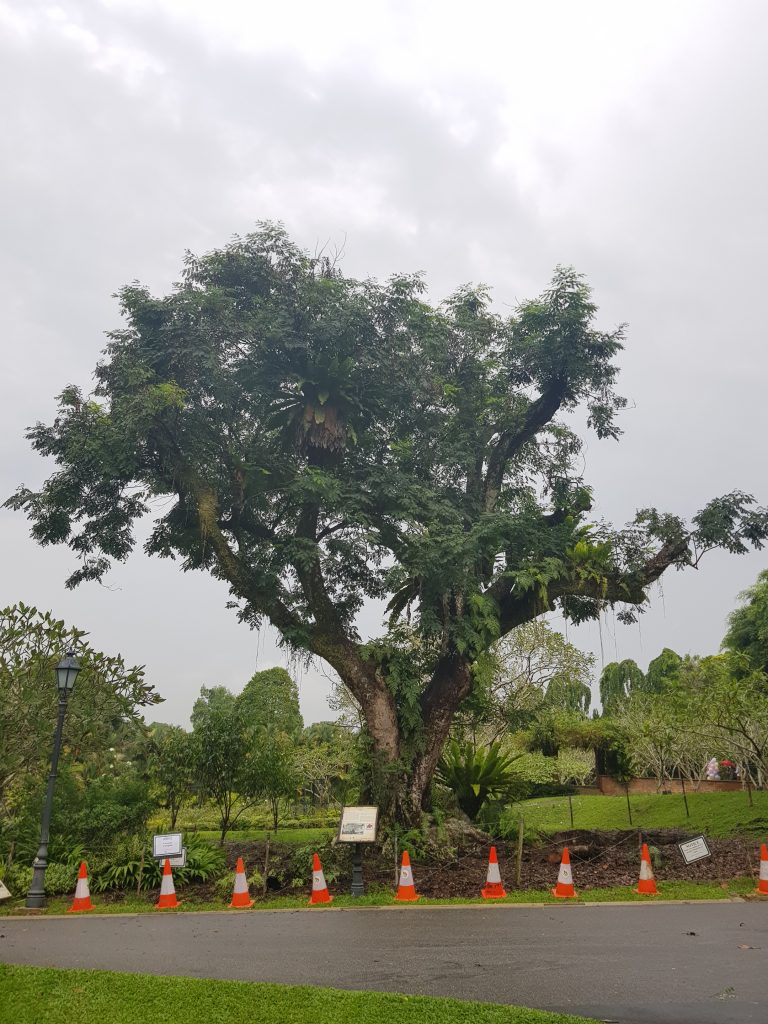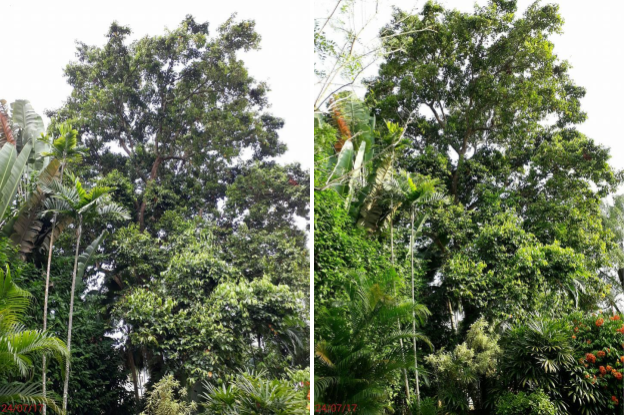Why Do The Trees In My Neighbourhood Have No Leaves?

Is your favourite tree bare after its latest pruning? What used to be a shady umbrella now resembles a hat rack, and the pavement beneath it feels hot enough to melt through your shoes.
What you have witnessed is known to arborists by a few names, topping, heading cuts, and yes, hat-racking. It is considered a poor practice (why topping is bad is a topic for another post), we would like to share a few reasons as to why it happens in Singapore.
Reasons for topping trees
1. Topping as a valid strategy for saving a tree
Take a look at this saga tree (Adenanthera pavonina) in the Singapore Botanic Gardens.
Source: NParks
Tree before topping.
Source: CSK Landscape Services (S) Pte Ltd

Tree after topping. Use the lamp post for scale.
It has been heavily topped. If topping is such a poor practice, why would the Botanic Gardens allow it?
The tree in question is a Heritage Tree, and some of its roots have decayed. The Gardens are worried that the existing roots may not be able to support its full weight, and instead of removing the tree entirely, they topped it to drastically reduce its load.
However, they also recognise that topping is stressful for the tree. The tree was only topped once, the area is cordoned off to prevent foot traffic, and a root zone regeneration regime, complete with extensive mulching, is in place to support the tree’s recovery.
This is a far cry from the repeated topping cuts made on trees in our neighbourhoods, where residents have free access to the root zones. To understand why it happens, let us start with the tree workers.
2. Tree workers may not know better
If you have ever been disturbed by a buzzing chainsaw in Singapore, it was most likely wielded by a migrant worker.
Source: Wong Fong
Not an easy job.
Some of these migrant workers may not know better, and apply the most straightforward, but also harmful, pruning technique. Tree topping.
However, having worked with them, our migrant workers are also extremely efficient at taking instructions, and learn very quickly. There are significant challenges in coming to work in Singapore, and they have street smarts in spades. If the right instructions are given, proper tree care can still happen, which brings us to the contractors who hire the migrant workers.
3. The customer is always right
Competition is fierce in Singapore’s landscape industry, and contractors do their best to give a good price. This is good for the consumer, but stressful for landscape contractors.
Source: Sunny Fantasy
Every tree pruned faster and cheaper than the other guy.
You may be familiar with the high costs of owning private vehicles in Singapore. Owning a lorry crane for tree work is no different, and contractors barely break even on most jobs.
The contractors will do their best to fulfill a tree owner’s wishes.
So who are these tree owners and what do they want?
For that, we have to think of the people managing the land trees grow on.
4. Town councils and facility management
Imagine you are a town councilor, facility manager, or any other tree owner. The contractor calls you to tell you that the job has been completed, and you are given these “before” and “after” tree work photographs.
Source: CSK Landscape Services (S) Pte Ltd

Before (left). After (right).
Can you tell if any work has been done at all?
For this job, over a hundred kilograms of leaves and branches have been pruned to prevent future problems. However, it is difficult even for a trained arborist to tell if any work has been done at all. If a tree is healthy, good tree work looks like no tree work.
Now imagine you are the facility manager again. There are a hundred other complaints pouring in, lift maintenance, mosquito breeding, neighbour disputes, the list goes on and on.
If a contractor comes up to you with almost identical tree photos and says work has been done, you will have to spend precious time verifying their claims.
However, if the contractor has an easy way of showing their work, such as with photos of topped trees, you can pay them and move on to other pressing matters. As an added bonus, the contractor has also helped you with one other major resident complaint…
5. Residents complaints
You may be wondering, what is there to complain about lush and shady public trees? The noisy, pooping birds roosting in them of course!
Source: Bird Ecology Study Group
Feathered friends, noisy neighbours.
Topping trees to solve this problem is the very definition of passing the problem to somebody else. The birds find another tree to roost, some other residents complain, and eventually, every tree is as bare as a baby’s bottom.
More comprehensive solutions involving better food waste disposal and animal control will probably be needed, perhaps a reader with a better understanding of bird ecology will have a better solution than tree topping.
What you can do to help
The good news is that complaining works. It is how we ended up with bare trees in the first place. The people who complain about noisy, pooping birds, are louder than the people complaining about bare trees.
The next time you spot a bare tree, take a photo of it, note the location, and go here,
Submit a case. The louder people complain about bare trees, the more likely alternative solutions to tree topping will be developed.
If you are in a position to hire contractors for tree work, we hope this post has piqued your interest in proper tree care.
If you have any doubts, we are happy to help, and can be contacted via email at,
